Best of #econtwitter - Week of May 1, 2022 [1/3]
May 02, 2022
Welcome readers old and new to this week’s edition of Best of Econtwitter. Thanks to those sharing suggestions, over email or on Twitter @just_economics.
This is part one of three.
Paper summary threads

Alice Evans@_alice_evans
South Africa’s alcohol ban reduced violence by about 20%
The ban led to an estimated 77 fewer homicides, 790 fewer assaults & 105 fewer rapes PER WEEK.
econstor.eu/bitstream/1041… by @kai_barron & colleagues; forthcoming in the Review of Economics and Statistics.
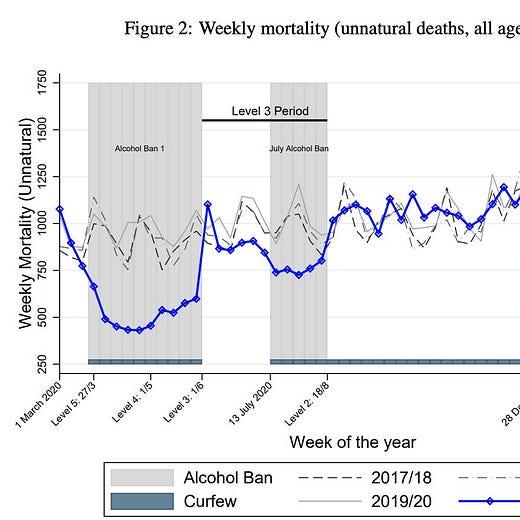
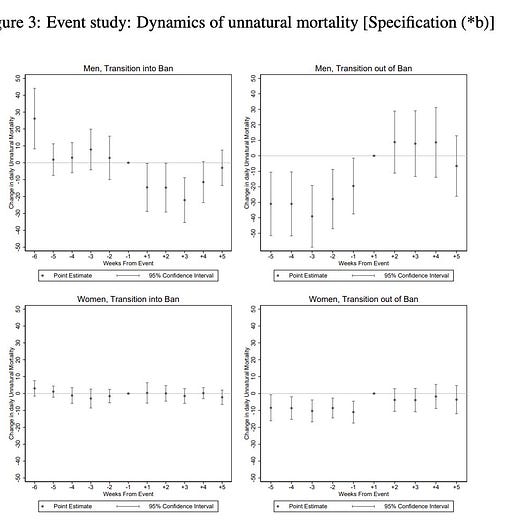
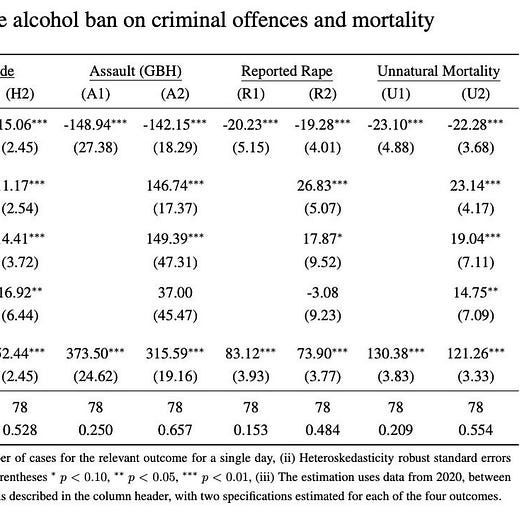
6:52 AM · Apr 29, 2022
12 Reposts · 31 Likes

David Holtz@daveholtz
🚨 Excited to announce that “How Much Do Platform Workers Value Reviews? An Experimental Method” with @ssuri and @LSCULT, has just been published in the proceedings of #CHI2022.
bit.ly/3y21i5f
🧵 Here’s a quick thread that explains what we did👇:
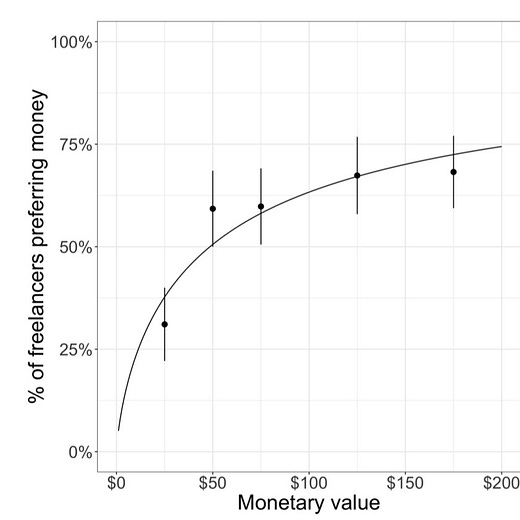
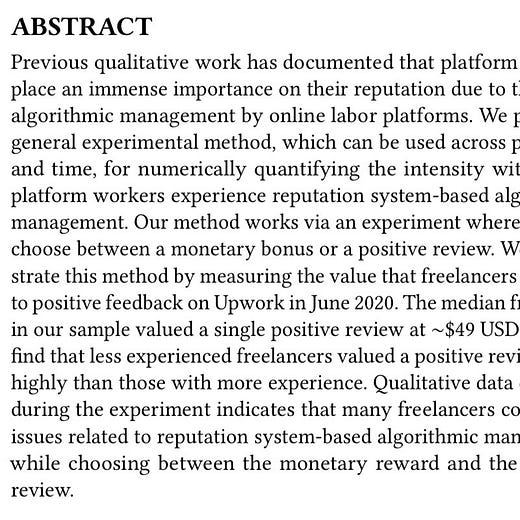
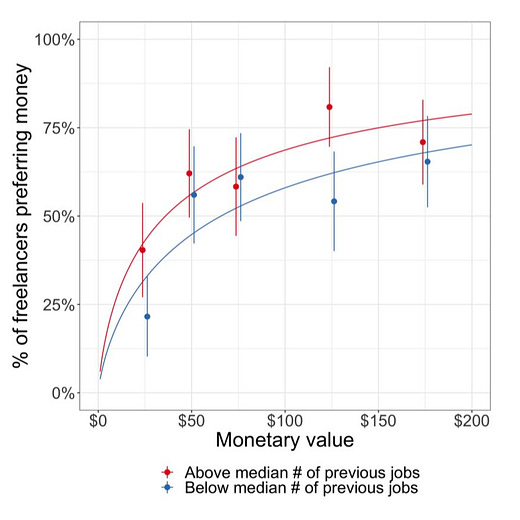
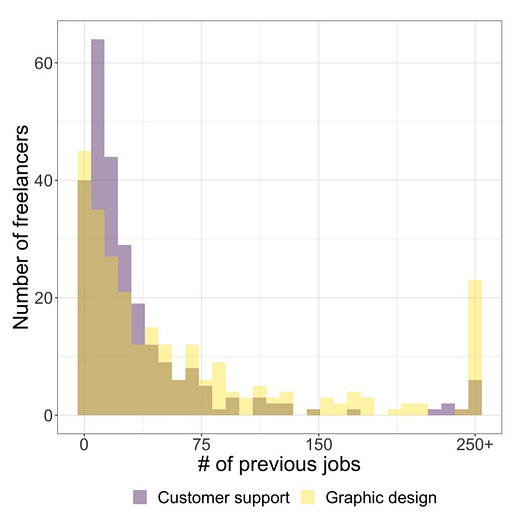
2:56 PM · Apr 29, 2022
13 Reposts · 51 Likes

David Holtz@daveholtz
After they completed a recruitment task, we gave each worker the choice between a positive review or a bonus randomly selected from {$25, $50, $75, $125, $175}. The freelancers got whichever option they chose.
We estimate a median WTA of $48.54 for a single positive review!

2:56 PM · Apr 29, 2022
1 Repost · 3 Likes

Leonardo D'Amico@leonardo_damico
Happy to share our paper with Guido Tabellini!
Have you ever talked with someone with a different ideology from yours and felt that you were starting from a radically different set of beliefs on *factual* aspects of reality? This feeling motivated our paper. #EconTwitter
A 🧵

CESifo @CESifoGroup
Online Political Debates | @leonardo_damico / Tabellini, Guido | #EconTwitter https://t.co/tlH0ZNn1Bs https://t.co/L8hxUVThyn
4:16 PM · Apr 28, 2022
40 Reposts · 210 Likes

Journal of Public Economics@JPubEcon
Past political repression during Stalin's regime still undermines present-day social trust within the countries of the Former Soviet Union.
People living near former gulags also have lower civic engagement. The effects are independent of living near the arrest sites.
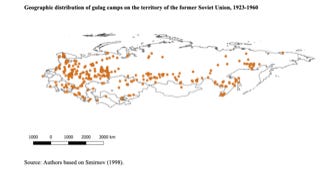
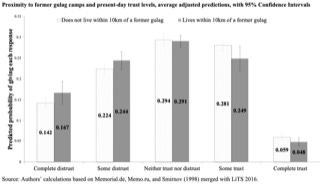
7:08 PM · Apr 25, 2022
3 Reposts · 4 Likes

Alice Evans@_alice_evans
Ethnic stratification appears especially high in West Africa.
📉 Negatively related to trust in relatives, neighbours etc
📈 Positively related to conflicts.
sciencedirect.com/science/articl…. Hodler et al, Journal of Development Economics.
Why is this not a *major* point of discussion?

5:16 PM · Apr 30, 2022
30 Reposts · 94 Likes

Brian Nosek@BrianNosek
Today's publication of Many Labs 4 is the 5th (yes, really) and final publication from the Many Labs series of replication studies.
Creating this series was exciting, challenging, & exhausting. I learned a ton. Hopefully, you did too. A short summary...
online.ucpress.edu
Many Labs 4: Failure to Replicate Mortality Salience Effect With and Without Original Author Involvement
6:12 PM · Apr 29, 2022
94 Reposts · 241 Likes

Jake Mortenson@jm0rt
New working paper w @jefflarrimore & David Splinter, relevant for anyone using UI benefits reported in the CPS
Takeaway: CPS missed over half of UI expansion. After correcting, UI dramatically reduced poverty rates, which would have reached a 6-decade low davidsplinter.com/LMS-UI.pdf

6:12 PM · Apr 28, 2022
21 Reposts · 69 Likes
Interesting discussions

Paul Novosad@paulnovosad
A key discovery of the RCT revolution in development was that most programs did not work as they were supposed to.
But when I get asked to referee papers these days, it's always about a low-cost intervention with transformational effects.
I don't know what to make of it. 1/n
2:38 PM · Apr 25, 2022
63 Reposts · 460 Likes

Brendan Nyhan@BrendanNyhan
Role of algorithms in modern social media is more complex - they don't just maximize engagement and in fact hold down certain kinds of low-quality content. Strongly recommend @deaneckles testimony (expert at MIT Sloan, ex-Facebook) ide.mit.edu/wp-content/upl… - one relevant excerpt:


Matthew Yglesias @mattyglesias
I think @binarybits makes the key point here — algorithmic news amplification gives a positive advantage to misinformation.
Trying to check that advantage with content moderation then becomes very clumsy.
https://t.co/Ay7EgOCWrn
9:27 PM · Apr 26, 2022
19 Reposts · 50 Likes

Alicia Plemmons@Alicia_Plemmons
Econ is lacking in supplementing empirics with real-world insight. When was the last time you wrote a paper on Uber and talked to an actual driver? Or on lending practices where you talk to the people applying for loans? I want those interviews with the long lit reviews sections.
10:04 PM · Apr 27, 2022
47 Reposts · 575 Likes

Jacob Bastian@JacobBastian25
Crowdsourcing a lecture on data sources/availability for my PhD students:
Including what’s available (ACS, CPS, PSID, NLSY, IPEDS, SIPP, etc), short description, pros and cons, etc.
Thanks for sending me your ideas and notes.
#econtwitter
2:58 PM · Apr 25, 2022
40 Reposts · 233 Likes

Andrew Friedson@FriedsonAndrew
Ran a simple "DD" model on 55 outcomes within the same dataset.
22 statistically significant based on classic twfe estimator.
Switched to Callaway-Sant'Anna (csdid in STATA), 12 are significant based on avg ATT. 4 that were previously, but 8 that were not previously.
6:25 PM · Apr 26, 2022
8 Reposts · 114 Likes

Econ Journal Watch@EconJWatch
What are your most underappreciated works? An invitation to social-science/humanities scholars with 4k+ Google Scholar citations:
econjwatch.org
What are your most underappreciated works? · Econ Journal Watch

3:34 PM · Apr 29, 2022
6 Reposts · 8 Likes

